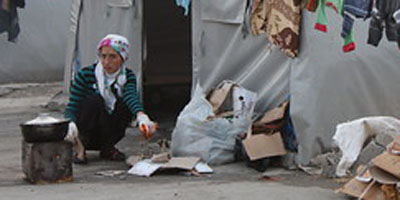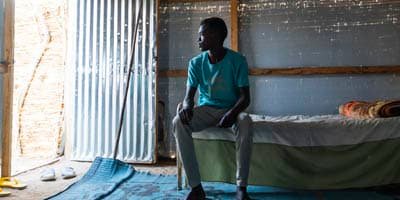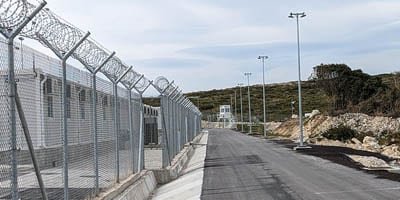Gender-based violence targets women and girls in the largest forced displacement crisis in the world with almost 14 million Syrians in need of humanitarian assistance, 5 million of them women and girls of reproductive age. A rise in gender-based and sexual violence affects vulnerable groups, particularly Syrian women and girls, tearing families apart and destroying communities. Syrians are internally displaced or have fled to neighbouring countries like Turkey seeking refuge or asylum.
I spoke with five experts about the situation of those women and girls.
Part 1: Syria
People who fled to neighboring countries like Turkey are refugees, whereas some seven million people affected by the crisis, for example having lost their homes but remaining in the country, are internally displaced persons. Any UN operation within the country must adhere to Syrian laws.
Interviewee: Marta Pérez del Pulgar, UNFPA Deputy Representative in Syria 2016-2018 and Gender Based Violence Programming and Research Expert. Del Pulgar worked with internally displaced women and provided a different UNFPA perspective on dealing with the crisis. While in Damascus, she led the UNFPA program as part of the response operation from inside Syria, which meant working with the government and with Syrian counterparts.
Women in the Syrian crisis
“Syrians are surrounded by constant, systematic and normalized violence in all its forms. The country is at war. Violence is everywhere and gender-based violence is just another form of violence surrounding people in their everyday life.
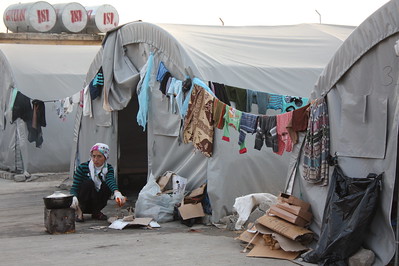
“Yet in most cases, women are nowhere to be seen. Systematically silenced, we’re not in the media. We are not part of the discussions, the fact that there’s a women caucus is almost invisible whenever you read any news outlets about the Syrian conflict. And I think this has a lot to do with the way in which the different parties are using information coming out of Syria, to feed into their own interests and messages.
“There were negotiations, discussions with the government, civil society organizations, international NGOs, with regards to women’s participation, from everything – from prevention from violence, risk mitigation measures, a gender-based violence response, but also with regards to decision making, with regards to policies, with regards to the different groups that were being represented in the interest area peace talks.
“The difficulties from the side of the partners was not because there was resistance, but because in many cases there was a lack of understanding of what it actually meant and what the specific risks actually were resulting in women and girls not being on the top of the agenda, not because they were not important, but because people were carried away by other duties and responsibilities.”
Women Shelters vs Women and Girl Safe Spaces
“While it was positive with the government, there were some issues because their understanding of what gender-based violence prevention and response services should be and their understanding of what the referral pathway should be, was not necessarily compliant with the international standards so it became sensitive and difficult to manage.
“For example, the Syrian government was keen in setting up homes or shelters where women, particularly survivors of gender-based violence, would be brought in and receive services. This meant that these women were basically confined in an internment center, which goes completely against international standards. These shelters should only be for life saving services or temporary solutions.
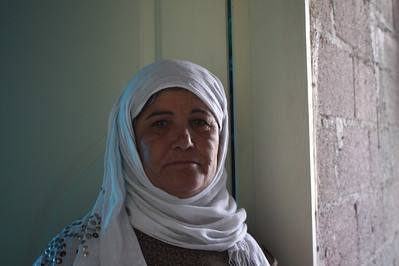
“UNFPA and partners had a network of over twenty comprehensive women and girls safe spaces within Syria, a place for them to find peer support and reconstruct their lives with a component of peaceful coexistence and social cohesion. These centers were being provided with confidentiality, safety, and non-discrimination.”
Transformation of Gender Roles within Syria
“There were social dynamics prior to the conflict that have been exacerbated due to the conflict. It is a very strong patriarchal society with gender roles that have changed because men have left, men have died, men are at war, or men are now disabled because they have suffered some kind of injury. Women have been left alone, dealing with everything dealing with earnings, they have become farmers, they have become fighters, they have become the breadwinners when they had actually been brought up to get married, and raise a family.
“So those roles have also changed. Additionally, there aren’t sufficient men for all the women who want to marry to actually marry, which has contributed to a very profound social transformation that we will need to wait and see where this goes. This can be largely linked to the empowerment of women and girls, and understanding the deep changes that the conflict is having in the social structures. If we continue training women as hairdressers in a country that needs to be rebuilt, we are less likely to see a positive outcome. The future of jobs in Syria needs to include women working as plumbers, brick makers, in construction etc. as there won’t be as many men to do these jobs. For women to understand and see themselves from a different position in itself requires a transformation and, at this rate, in Syria we cannot expect that to come along.”
Male Engagement – necessary for change
“Male engagement is crucial because without adequate male involvement, it becomes difficult to achieve the necessary gender transformations and effectively be able to provide sexual reproductive health services in Syria. If women have access to contraception, but are not the ones who make the decisions in the household with regards to family planning, providing sexual reproductive health services and access to contraception will not directly have an impact because the decision does not rely on them but by their husbands.
“Working with community leaders, who were always men, when setting up women and girls safe spaces in some cases men were upset. I remember a very specific case where men were upset because they did not understand what their wives were doing there. So we did identify that there was a need to explain to them why these safe spaces are women only. The moment you start bringing in men to a women and girls safe space, the perception about safety is at risk.”
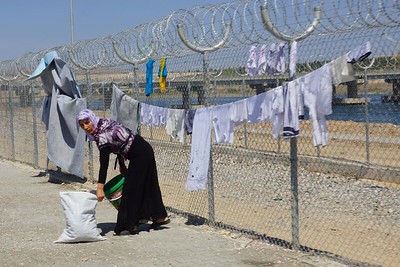
Child marriage
“There are patriarchal norms that were discriminatory that existed prior to the conflict and are the ones that have also been exacerbated and this has implications for negative coping mechanisms like child marriage.
“I was talking to a girl; she was 12, from a remote area in a village. There was a school in her village, so she was kept in school. The year after, she was already moving to high school, which was in the city. Her family did not have the money to pay for her transportation to go to school. So the girl was saying, ‘What are they going to do with me? I’m at home, I cannot work, they will marry me off. And I don’t want to.’ She was really upset, she was screaming, crying.
“In rural areas, the situation was adolescent girls, adolescent boys, working in the farms, One is 15, the other one is 16, both adolescents. They like each other. If they want to be together, they have to get married. So it was very different from this other girl who was going to be married off to a much older man.
“Under the Sharia law, for anyone to be able to have sex, they have to be married. So areas held under opposition groups, radicalized opposition groups who followed Sharia, what they would do is called serial marriage. They would marry the girl or the woman, have sex and divorce the day after.
“So in some cases, it’s a negative coping mechanism. In other cases, it’s a social norm. In other cases, it’s fragrant, sexual exploitation and abuse.”
Interviewee: Jennifer Miquel, Head of UNFPAs Regional Syria Response Hub, has eighteen years of experience in development and humanitarian contexts at the United Nations and with international NGOs.
Women’s well-being – the challenges and responses
“When we ask women and girls what they want, its safety, security and livelihood opportunities. The things that lead to gender-based violence, or the events that increase it, are the crisis itself, COVID and the economic crisis.
“It’s quite a patriarchal society. The laws do not favour women and girls, and we continue to see things like domestic violence, sexual violence, harassment, early forced marriage, psychological abuse and denial of resources.
“In terms of health care we make sure that there are doctors and midwives etc. who are trained on how to respond and provide clinical care for survivors. We also make sure that there’s enough supply of emergency contraception, post-exposure prophylaxis to prevent the transmission of HIV, and then antibiotics to prevent the spread of STIs.
“What’s very difficult, though, in most of the countries in the region is that you also have mandatory reporting. If the survivor goes to a doctor, the doctor is obliged and mandated to report that to the police. It comes from a very legal point of view, that a rapist has to go to jail, but it doesn’t take a survivor-centered approach. It doesn’t look at what that woman needs and what her choices are. Sexual violence is incredibly disempowering
“We try to ensure that the women that have experienced this are re-empowered” and “then we also try to look at the situation holistically and put in place prevention programs. So we start working on negative social norms that perpetuates the violence and patriarchy.
“One of the main interventions throughout this crisis is Women and Girls Safe Spaces – a place that women and girls can come to rebuild social networks, if they’re lost or if they’ve been displaced. There are over one hundred Women and Girls Safe Spaces throughout the region where women and girls come, seek specialized care, meet other women, make friends, choose activities they want to learn to build their skills etc. It’s also an opportunity for the staff to talk about rights and share more information. This offers an opportunity to build their skills and do activities and learn information.
“The majority of the time they ask for sewing or learning how to do makeup or hairdressing – activities that perpetuate these gender norms. UNFPA aims to change these norms and empower them so that being a woman is more than just cooking, cleaning, makeup etc. by making these spaces more gender transformational. And so these Safe Spaces are places where they could make decisions.
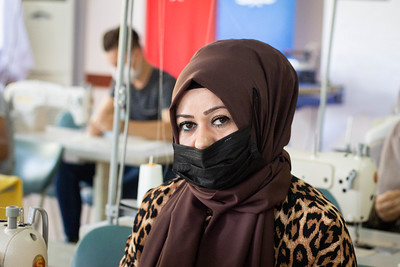
“Adolescent girls, for example, if they’re not married in many places, they could not access any contraception. A woman has to be married and that makes it very difficult. One of the things that we’ve tried to do is as UNFPA is to make sure that a lot of the services that we provide are integrated. In some locations, in some countries, we have more comprehensive centers where, in one side of a facility, you’ll have full comprehensive sexual and reproductive health services and, on the other side, a little place a little bit more discreet, the Woman and Girl Safe Spaces, because also, it’s really taboo to go and seek sexual reproductive health services.”
COVID-19
“Before COVID hit, there were plans that from 250,000 to 500,000 Syrian refugees might start going back to Syria, because the situation in some parts of the country had stabilized a little bit. Essentially, many people wanted to go back to their home if it was safe with all these conditions, but now with COVID, and with the situation having gotten worse, and with the economic crisis, no one’s going home.
“COVID-19 has increased intimate partner violence, specifically family violence. A major issue was a huge de-prioritization of sexual and reproductive health and GBV services. It was all about managing COVID. More people were at home due to the lockdowns and the vulnerable women and girls were unable to come to the centers for support.”
Part 2: Turkey
Around six million people have fled Syria, with almost four million of them in Turkey. 3.6 million of them have registered as refugees. Since 2011, Turkey has hosted the largest number of refugees in the world.
Interviewee: Zeynep Basarankut Kan, UNFPA Assistant Representative at Turkey’s Country Office, worked on several projects focusing on alleviating the impact of the crisis on Syrian refugees.
Challenges to safety and security
“An important milestone was when the Turkish government issued atemporary protection law, giving the registered Syrians inside Turkey the right to access public services like any citizen, which needs to be recognized.
“UNFPA works particularly on reproductive health and gender-based violence, so we’ve identified a lot of issues in terms of access to specifically sexual reproductive health and prevention and protection services, which required customized programmes for the most vulnerable refugees”
Increasing rates of child marriage
“Child marriage, marrying under the age of 18, is also quite prevalent. 44% among Syrian women have married underage and 40% of these have children before they turn 18.
“Due to economic and social cultural reasons, you see that a lot of children are married and then comes the pregnancies and we know that a child or teenage pregnancy is very risky compared to an adult’s.
“We also know that they don’t have access to any kind of family planning, so it’s a continuous cycle, they give birth, then they get pregnant again, and again. The fertility rate is high. For every Syrian woman, it’s around six children per woman.”
“Another problem is that half of the Syrian children are in education in the Turkish system, but half are not. And we know that particularly girls are not part of the education system. They are married early at a child age and they start having children. And how do you empower them? We know that if you’re part of a child marriage, if you have had a lot of kids, then your likelihood of being subject to domestic violence is high, your vulnerability is much higher.”
UNFPAs support
“UNFPA responds to gender-based violence by establishing or supporting health clinics for sexual reproductive health component, antenatal care, newborn care, family planning services, clinical management of rape, psychosocial support for gender based violence.
“They’ve never heard information on family planning. They don’t know where to access contraception, or antenatal or newborn care. There’s just so much misinformation and cultural norms in place.
“In terms of psychosocial support, they’ve come to Turkey with a lot of trauma. A lot of family members that have been killed, that have been tortured, they themselves have been survivors of GBV and then they carry it. So you need to provide psychosocial support.
“With COVID prevention, a difficulty was that the refugees have been through a lot already so they either just didn’t care about COVID or didn’t believe it was real. They are afraid to get the vaccine or don’t know how to access it, so providing correct information and effective communication has been important to the programs during the pandemic. The centers for a period also had to turn into an online and appointment-based system to avoid crowded waiting rooms.”
Interviewee: Kadir Beyaztaş, Deputy General Coordinator of the Association for Solidarity with Asylum Seekers and Migrants (ASAM), the largest NGO in Turkey supporting refugees and asylum seekers from conflict zones like Syria. It has implemented several projects with UN agencies including components on gender-based violence response to refugees.
Challenges facing Syrian refugee women in Turkey
“Uncertainty is the most important concept here to describe the current situation, as we still don’t have any consensus among international actors. It’s unfortunate that there’s no positive sign for the region.
“Registered asylum seekers, both Syrian and non-Syrian, have the right to access services. However, in practice, there are difficulties due to different reasons such as insufficient infrastructure, capacity of institutions, and the economical situations of the refugees.”
ASAM’s role in supporting Syrian women
“ASAM doesn’t only provide information, but answers their questions and concerns to understand their perspective and validate their feelings. It’s important they are not left confused or alone.
“Gender-based violence victims often don’t report to the police or legal institutions because they have a false belief they’ll be deported, so it’s critical to explain their rights interactively through a comprehensive process Empowerment is crucial to supporting refugees, particularly survivors of gender-based violence. But when these women are put into women’s shelters, where for example their 15-year-old son can’t enter, it becomes difficult. These shelters are temporary and finding a durable solution is the only productive way forward.
“Trust relationships lead to more refugees coming to ASAM for emotional assistance, psychosocial support that the state would not provide. If refugees come to ASAM for ID support, we make other assessments as well. For example, we look for signs of gender-based violence, domestic violence based on their speech or behavior. If the woman seeking support has a child, they’re asked if they go to school, if they are married etc. The focus is not only legal and bureaucratic, but humane and comprehensive in order to establish a trust relationship. These refugees come with trauma and if they aren’t supported properly, they are left alienated in a foreign country.”
Part 3: Challenges to Integration
Interviewee: Dilara Berberoglu worked as a legal counselor for the Key Refugee Groups Project at the Istanbul Service Unit. She addressed the continuous legal issues that Syrian refugees in Turkey face, including their basic rights, human rights and access to services.
Theory does not equal practice
“With regard to the Syrian mass influx and Turkish Temporary Protection Regulation, there is a comprehensive and detailed structure in place, however in practice there are difficulties for various reasons, such as language barriers, misinformation or lack of information, and infrastructural or the capacity issues of the institutions. So, when we, as legal counsellors, inform our beneficiaries about their rights and obligations and they cannot easily access those rights nor services, it can be heartbreaking and frustrating for them.
“For example, in case of gender-based violence incidents, survivors can face difficulties making a formal complaint due to language barrier, lack of information on available legal mechanisms and where to go to make a complaint, how to follow up with the procedures, or misplaced fear of any negative impacts on their status. Even if they do reach out and ask for help, they might not get the necessary support or their complaints don’t get addressed.
“Regarding the citizenship law, although there are exceptional clauses for gaining Turkish citizenship for foreigners, there is a misconception about Syrians immediately receiving citizenship in Turkey. As a rule, temporary protection status holders in Turkey do not have the right to automatically obtain citizenship.
“However, as the mass influx happened nearly ten years ago, many of them started families here, so the next generation Syrians speak Turkish fluently and have a much easier time achieving social cohesion. Also, as Syria is a neighboring country, in many of the border cities people may have relatives on the other side which makes the route to integration easier. However, of course achieving social cohesion is complicated. There are some recent surveys showing that the majority of the participants, about 60%, are considering the possibility of returning home to Syria.”
Capacity Problems and Employment
“For many years, before the adoption of the law when a civil entity took charge of the migration field, it used to be dealt with by the Turkish National Police. Adoption of the legislation and the establishment of the new institution was a profound change in the system. Thus, it took some time to build up the capacity, to make the implementation of the law uniform. It is safe to say that both the authorities, related organizations and NGOs are getting accustomed to the recent numbers and are still working on improving their responses and mechanisms.
“There are still some challenges in the field, for example access to the labor market or the complexity of obtaining the necessary documents to work legally. And working in the informal sector creates a number of adjacent issues – not being able to raise your voice when you don’t receive your salary, or fearing to speak up in cases of work accidents.”
Registration Difficulties
“Unfortunately, COVID-19 hit the irregular migrants the hardest. There are set mechanisms and health services for registered migrants. They could get vaccinated, get treated and have access to medication. But irregular migrants without identification documents have difficulties accessing the hospitals or getting vaccinated, and when they cannot get vaccinated they don’t have the verification codes needed to go on with their daily lives. Also, in Turkey a satellite city system is in place, which means migrants can only get registered at cities determined by the migration authorities. Big cities, where irregular migrant populations are high, are currently not considered as satellite cities and therefore not open to registration, except in a few circumstances set by the authorities. In urgent conditions, such as with pregnant women, GBV survivors and human trafficking victims, migration authorities can use their discretion.”
Integration
“From a legal point of view, we could say that things are improving, and the practices are getting better, but gaps in services for GBV-affected women or other vulnerable groups are becoming evident and challenging, which could cause malpractices or unfortunate outcomes for persons in need.
“So uncertainty grows, in the sense of integration, where people may feel excluded or feel like losing their social or cultural background, not being heard, or recognized. As I mentioned before, temporary protection status holders do not have the automatic right to obtain citizenship which leads to their confusion about their status.”
Part 4: What Lies Ahead
Marta Pérez del Pulgar: “From what I have seen everywhere, COVID-19 has slowed down the projects and it has made access extremely difficult. Everything has gone online. Almost everyone has a cellphone, but not everyone has electricity, not everyone has money to pay for the internet etc.
“Schools are safe havens for girls but girls have been unable to go, so they are at higher risk of gender-based violence and child marriage. We also need to see after COVID how many girls actually go to school. The pandemic has created such a profound disruption of services in a country that’s already very deeply disrupted, that we will need to see what that will translate to.
“Syria used to have laws dictating how much you can inherit, who you can marry, from whom you need permission to be married. They were extremely discriminatory, but have been changing. The age for marriage has been raised to 18. That’s very important.
“Instead of referring women to another center for the provision of different specialized services, start thinking now that the situation is more stabilized on how to provide more comprehensive, holistic services for women, definitely as much as possible trying to avoid the shelters.
“Because of the mandatory reporting problem where doctors were obliged by law to report it even without the woman’s consent, many women were afraid to seek medical assistance which needs to change.
“Adhering to international protocol and standards is definitely something to continue working on, and developing the capacity of civil society organizations, at the national and subnational level.”
Jennifer Miquel: “The situation is worse this year than it’s been for years and the real fear is implementing programs that receive less attention, meaning less funding and fewer services while the population in need remains unchanged. Things need to move forward, the economy needs to stabilize and vaccines need to be accessible for Syrians internally as well as Syrian refugees abroad.
Commenting on the UNHCR, UN’s refugee agency, not planning a major return to Syrians right now because of COVID and other economic issues. Miquel said, “I hope for things to look less bleak next year. Syrians want to go back but not for the next twelve months, it’s not the right time as the conditions are unstable.
“The UN will support them if it’s voluntary, but the majority are in agreement that the conditions aren’t right for a mass return, which aligns with what the refugees want for now, based on surveys.
“It’s important to keep the Syrian crisis in the news even if it’s been ten years. Like this article, for instance, because if people start to forget there might be less money flowing, then less programs and so on. The situation is not improving and people still need support.
“The only thing that will stop this is a political solution to the crisis. So that’s what we hope for. A political solution where the war stops in Syria and that there’s peace and therefore people can return”.
Basarankut Kan believes that “what needs to be done is continued access to services – not only having rights, but having access and focusing on the most vulnerable like refugees, particularly the survivors of gender-based and sexual violence. With the pandemic, physical violence has only increased and therefore prevention and response to reproductive health and sesxual violence must continue. Looking forward, since COVID-19 restrictions increase domestic gender-based violence and disrupts access to services, we need to work on tackling the negative impacts of COVID-19 as we should expect future lockdowns.” He argues similarly to Jennifer that the ultimate long-term solution is peace in Syria. But even with peace, he says that “I predict maybe half will stay in Turkey so more interventions on social inclusion and cohesion is necessary. The more access they have to services like education and other social services, the more social cohesion and interactions there will be with the local communities. There are many Syrian babies born in and growing up in Turkey since it’s been ten years so they are no longer incomers and their social cohesion is important.”
Zeynep Basarankut Kan: “COVID has worsened their physical, psychological and economical condition. Refugees lost their jobs, gender-based violence victims were locked at home without access to services.
“Delayed access to basic public services like education and health care resulted in medium risk refugees becoming high risk cases More refugees have health problems as a result of the pandemic, particularly for women and girls. During the pandemic, state institutions were not functioning well as they made staff cuts and reduced their capacity. Some centers even refused applications, including women’s shelters and centers.
“The pandemic only added more trauma onto their existing trauma, so their vulnerability doubled. There have been issues in identifying individuals at risk on the phone as victims were not able to speak freely on the phone as they were in the presence of abusive household members like their perpetrators. Due to the pandemic and the COVID restrictions, many women haven’t been going to the hospital for birth and go to dangerous underground places instead.
“Awareness raising among law enforcement, like police stations, is important as they are the first place of resource for victims. But when victims or survivors first go to the police, they don’t take action. If a woman goes to the police center frequently, they are often blamed and told to figure it out with their husbands. But this leaves these women helpless and alone and this needs to change.”
What’s next
“Male engagement, working with men and boys, working with community and religious leaders, focusing on women empowerment, seeking new social norms and providing livelihood initiatives for women and girls that don’t just include traditional ones, like how to use a blow dryer, are all areas that need to be continuously improved and provided at a higher capacity,” Marta Pérez del Pulgar said. “The Syrian government and local organizations should push for more comprehensive women’s centers rather than confirmed women shelters as those serve as temporary solutions with limited livelihood opportunities.”
Zeynep Basarankut Kan and Jennifer Miquel agree that until there is a political solution and peace in Syria, humanitarian aid must continue. UNFPA continues to focus on their prevention and response to gender-based violence and improving the sexual reproductive health status of women, girls and vulnerable people.
Kadir Beyaztaş said that adjusting to the global pandemic in the middle of a refugee crisis as well as an economic crisis was not easy for Turkey.
“Before the pandemic, organizations in Turkey and state institutions were doing very well with the refugee crisis, but after the pandemic they lost most of their gains and were going back to where they started.
“It’s like when there’s an earthquake, the sea levels rise and flood into the cities and afterwards, the water goes back to the sea so you can see the damage done to the cities. And the pandemic, when it’s over, the situation and damage done will be clearer, which will help states determine how to proceed.”
